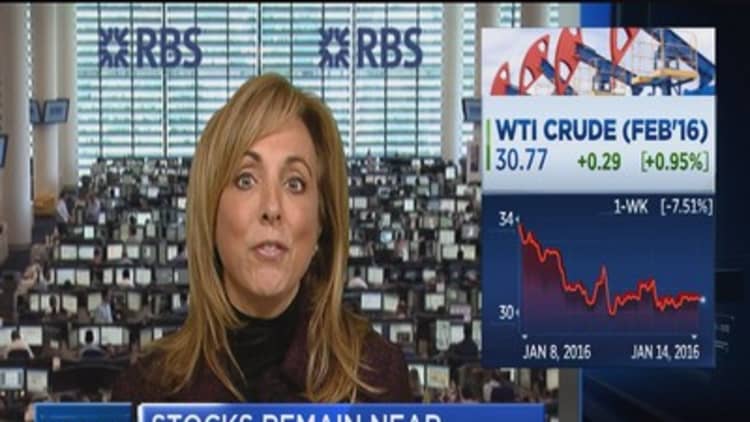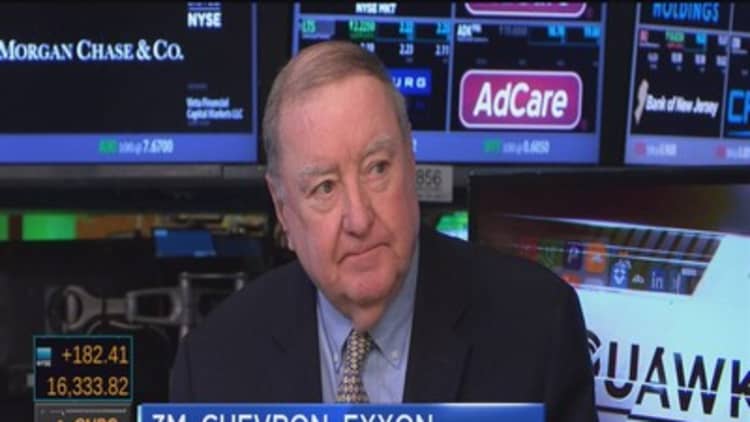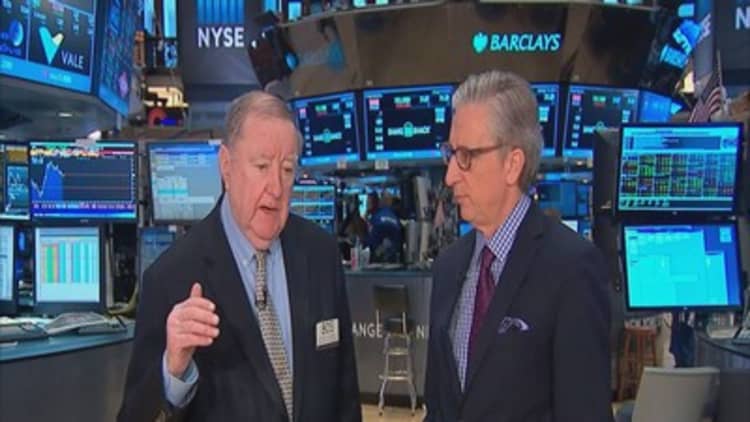


Markets are currently mired in a "sell the rally" mindset, and that sentiment will persist until investors get clarity on China's monetary policy and energy prices, Art Hogan, chief market strategist at Wunderlich Securities said Thursday.
"If we were to get either one of those things or both, or some hint towards either one of those things, I think the market can do a whole lot better," he told CNBC's "Squawk on the Street." That clarity could come by the end of the month or early in February, he added.
China's markets have twice been halted in recent weeks amid volatile trade as the People's Bank of China devalues the country's currency and regulators seek to roll back measures put in place to stem last summer's massive stock sell-off. The concern, said Hogan, is that China will commit a policy mistake or get too aggressive in its currency devaluation.
At the same time, crude prices have fallen to 12-year lows, with both U.S. crude and briefly breaking below $30 a barrel, a level seen by many as possible but implausible just months ago.
The fact that the Federal Reserve appears set on an "aggressive" pace of rate hikes and the onset of earnings season are also making investors wary of getting back into the market, Hogan added.
U.S. markets sold off dramatically on Wednesday, with all major averages in correction territory. The ended down 2.5 percent and fell below the key support level of 1,900.
In December, Hogan told "Squawk on the Street" he believed markets could return 8.5 percent in 2016. That forecast was significantly higher than many of the large banks' projections at the time.
What has changed since then is a growing perception that China's economy is beyond its leaders' control, he said on Thursday. Investors are concerned about the pace of currency devaluation, and while the central bank will probably get it right, the market is betting it will in fact get it wrong, he said.
"The steps they're taking, that they're very new at, are probably going to cause a lot of uncertainty in the global economy," he said. "They're new at currency devaluation."
Michelle Girard, chief U.S. economist at RBS, said those bearish factors are not changing her estimation for growth at home and abroad.
While the current low energy prices have negative near-term impacts on a number of sectors, far more consumers, companies and countries benefit when crude prices fall, she said.
"Quite honestly, I continue to be just confounded by the fact that as energy prices come down we're getting more and more negative about the growth outlook," she said.
That said, Girard added that oil price stabilization and confidence in China would give markets clarity on how many times the Federal Reserve can raise interest rates this year, and therefore what the cost of borrowing will be.
The central bank has indicated it plans to raise rates four times, a number Girard called "very gradual" rather than aggressive.
On Thursday, St. Louis Fed President James Bullard said the oil price rout may suppress headline inflation for longer than previously thought. Inflation below the central bank's 2 percent target would typically cause its policymaking committee to reconsider raising interest rates.
Another voting member of the committee, Boston Fed President Eric Rosengren, said Wednesday the divergence of U.S. and global growth may also stay the Fed's hand.
Taken together, that could mean the Fed will take back its December 25 basis point hike, its first in nearly a decade, said Art Cashin, UBS' director of floor operations at the New York Stock Exchange.
Should the Fed roll back that increase, markets could get a relaxation rally, but the overriding concern is that a reversal will cause the central bank to lose credibility, he said.
"People will say [IMF President Christine] Lagarde told you not to do it, Larry Summer told you not to do it, the Bank for International Settlements told you not to do it," Cashin told "Squawk on the Street."





